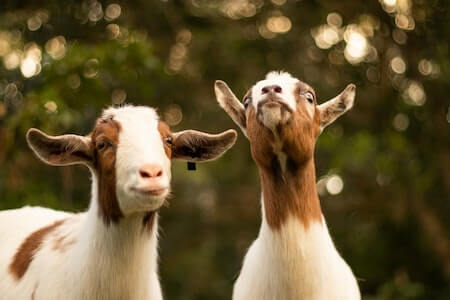There are many misconceptions about goats. One of the most popular is that male sheep and female goats, or one sex can be distinguished by their horns. This is not true: both sexes have horns. Males tend to grow larger and more elaborate horns than females, but it’s easy to get mixed up if you don’t know what you’re looking for.
A good rule of thumb is that males will have a thicker neck than females. If you still aren’t sure which animal is which, try looking at the tail: in goats, this usually sticks out sideways while in sheep it hangs down below the body.
There is a myth that only female goats can be milked, and that male goat will kill young kids: this is half true.
Male goats do sometimes try to mate with females who are giving birth, so it’s important to separate the two sexes before the kids are born.
Goats aren’t nearly as good-natured as sheep. If you try to put a saddle on a goat it will probably take a lunge at you with its horns while trying to escape.
At the same time, they’re not quite as bad-tempered as their Latin name suggests: “Capra Aegagrus,” which means ‘wild goat‘.
Goat vs Sheep Farming
The decision of whether to farm sheep or goats can be a difficult one. Some people may choose to raise both sheep and goats, but others might want to focus on just one animal.

Goats are easy-to-care-for animals that require less space than their counterparts the sheep, which means they’re a good option for anyone with limited land resources. They also produce milk more quickly than a cow, making them more efficient in terms of time spent producing milk versus meat.
Goats don’t need as much feed as sheep either – while some goat owners will supplement their diets with hay or grains, others may not even give them any at all.
Pros of Goats
- Goats are more easily cared for than sheep.
- Goat milk is said to be easier to digest than cow’s milk, according to some sources.
- They produce milk more quickly than cows which makes them an efficient option.
Cons of goats
- Some breeds grow larger than others, resulting in the need for more food and space. And, since they’re ruminants, their waste can become a problem if there is not enough land on which it can be disposed. If you have ample pasture space available though this should not pose too much of an issue.
- Some breeds tend to spread out or wander away from home which also requires extra supervision if this is something that might bother.
Pros of Sheep
- The animals eat less and produce more than goats.
- They are easier to herd together when moved from one grazing ground to another, according to some sources.
Cons of Sheep
- If you are raising the sheep for their wool, this extra step in shearing them is not ideal. Also, they can easily become sick or injured if they are overworked in hot weather.
- A heavier animal means an increased need for food and space on your part. Some breeds can grow up to twice as large as other breeds which makes them harder to move around if needed.
Difference between Sheep and Goat
The difference between sheep and goats is a common question. They are both farm animals, so they have a lot in common, but there are some key differences between the two.
Sheep have curlier hair than goats do and goats’ coats can be either long or short depending on the breed of goat. Goats also have horns that grow from their heads while sheep do not.
Goats tend to be more vocal with loud bleating noises as well as head-butting behavior when they feel threatened, whereas sheep make less noise and won’t usually butt heads with you unless they’re being aggressive.
Sheep are much larger than goats. They have a longer hair coat that is more coarse compared to the soft fur of a goat.
One other key differentiator is their teeth: sheep have an incisor on the inside corner of each jaw, whereas goats usually have one tooth on either side of the lower jaw.


